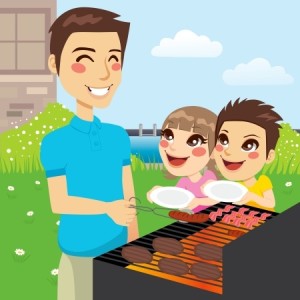Gas Grilling Safety in Jefferson & Frederick County, MD
By Wilmer Romero on Jun 12, 2014 in Home & Lifestyle
 Chances are that when you think of outdoor grilling, you think of “Dad” slinging the burgers and franks while making small talk with family and friends, and all while keeping a watchful eye on the little ones.
Chances are that when you think of outdoor grilling, you think of “Dad” slinging the burgers and franks while making small talk with family and friends, and all while keeping a watchful eye on the little ones.
At least that’s the stereotype. And, like most such stereotypes from the days of Ozzie & Harriet and Leave it to Beaver, that one’s pretty much gone in smoke. The fact is that just about everyone has an outdoor grill these days, and Dad has learned to make room for Mom at the controls.
But there’s one thing that hasn’t changed, and that’s the basics of outdoor grilling safety: gas, charcoal, and wood fires included. If you’re relatively new to the whole outdoor cooking thing, it’s especially important that you read and observe the following safety tips. Even experienced grill masters can learn a thing or two, so we urge you take a few moments to freshen up barbecue IQ:
- Don’t take food out of the cooler or refrigerator until you’re ready to cook it. And when the meal is done and everyone’s had their fill, cover the leftovers and refrigerate them immediately. The longer food is kept at room temperature, the more bacteria has time to grow and poison your food.
- Getting smoke in your face when the wind makes a sudden change in direction is more than an annoyance. That smoke, you see, contains carbon monoxide and PAH (polycyclic aromatic hydrocarbons), and other dangerous substances. And PAH can cause cancer. So keep the smoke away from your nostrils, and advise all your guests to do the same.
- Did you know that up to a few pounds of grease can accumulate on your grills catch tray after even just a few cookouts? So clean them often to help minimize the risk of fire.
- The number one cause of gas grill fires, however, isn’t grease. It’s anything that obstructs the path between your natural or propane gas supply and the charcoals. So regularly inspect your grill for bugs, leaves, and other debris that often find even hard-to-get-at places inside or underneath your grill.
- At the same time, there are more fires from conventional charcoal than gas grills. The majority of these take place while lighting the grill, especially if you use lighter fluid vs. “ready to light” charcoal. So for added safety, stay away from the lighter fluid if at all possible, and yet never pour more onto the fire when you already have a fire going. And never take your eyes off the flames until all the charcoals turn white and the flames have subsided. A sudden shift in the wind can prove disastrous to people and property.
One way to increase your outdoor cooking safety is with a built-in gas grill. At Your 1 Plumber we can install one for you along with a dedicated gas line that connects from your home propane or natural gas supply. That would end your reliance on both regular charcoal cooking and propane tanks for good, thus eliminating two known fire hazards. For more information, contact Your 1 Plumber today.

Post a Comment
You must be logged in to post a comment.